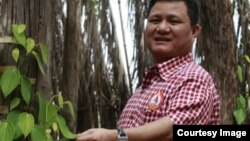The environmental watchdog Global Witness has issued a new report, naming Cambodian business tycoon Try Pheap as a leading force behind the destruction of the country’s forests.
“Try Pheap and his network are destroying Cambodia’s last forests and robbing indigenous communities of their livelihoods,” Megan MacInnes, a campaigner for the group, told VOA Khmer. “Meanwhile the very officials in Cambodia who should be stopping them are conspiring to ensure that contraband wood enjoys safe passage and is exported as seemingly legitimate lumber.”
Representatives for the Try Pheap Group could not be reached for comment on the allegations.
MacInness said the group has systematically damaged Cambodian forests. “The Try Pheap Group’s raids on Cambodia’s last forests are tantamount to daylight robbery,” she said. “The company is routinely and brazenly flouting laws aimed at protecting Cambodians and the ecosystems they rely on. This is yet another example from Cambodia of political power and business interests trumping citizens’ rights, and the wholesale capture of the country’s natural resources by its corrupt ruling elite.”
Government spokesman Phay Siphan rejected the allegations, saying the timber that is exported from Cambodia is properly licensed and managed.
But MacInness says the illegal logging is a huge problem, and she urged the Cambodian government to take action.
“The Royal Government of Cambodia must urgently tackle illegal logging and better protect endangered trees and the rights of forest dependent communities,” she said. “It must also take immediate action to investigate evidence that Okhna Try Pheap and those under his control are involved in illegal activities.”
Meanwhile, authorities in Hong Kong and mainland China—where much of the wood is sold—must work to suspend the import of illegal timber, particularly from Cambodian trees known as “hongmu,” she said, “and introduce legislation that prohibits the import, trading and processing of illegally harvested timber and products derived from such wood.”




